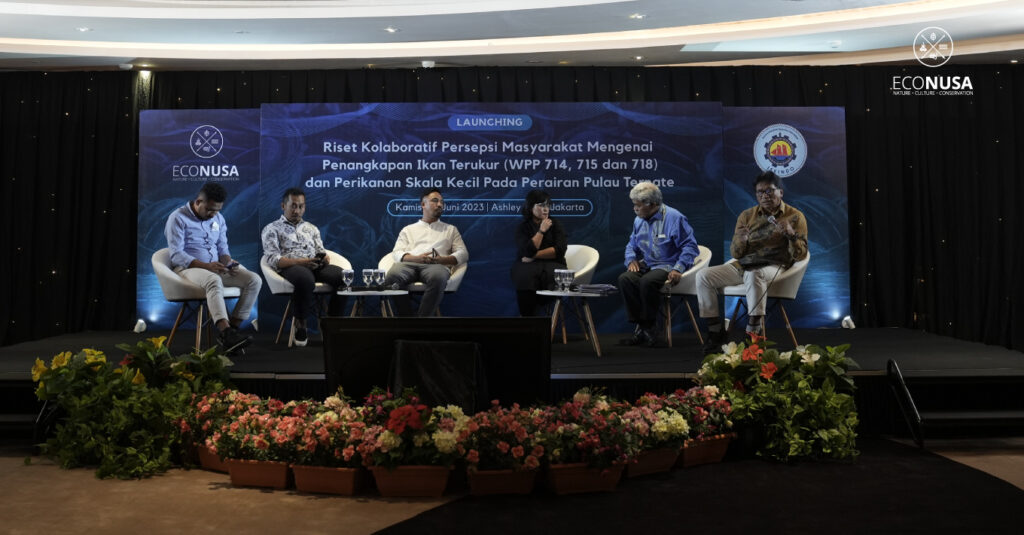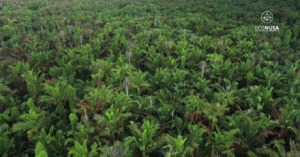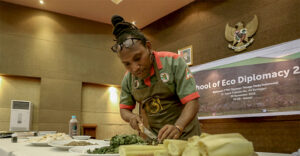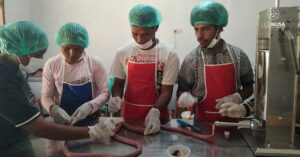
Small-scale fishermen are the backbone of Indonesia’s fisheries. The Ministry of Marine Affairs and Fisheries recorded a total of 2.22 million small-scale fishermen in Indonesia. However, many of these small-scale fishermen are unaware of the measured fishing policy that was established on March 6th, 2023, under Government Regulation (PP) No.11 of 2023 concerning Measured Fish Catch.
The facts were presented by researchers during the Launching of Collaborative Research on Public Perception about Measured Fish Capturing (Fishery Management Areas (WPP) 714, 715, and 718) and Small Scale Fisheries in the Waters of Ternate Island, organized by the EcoNusa Foundation, inline with the celebrations of World Oceans Day, June 8th, 2023.
Muhammad Zia Ulhaq Payapo, a lecturer at the Maluku Polytechnic of Marine and Fisheries, stated that most of the respondents in South Seram, Maluku have not aware about the measured fisheries policy, the development of the national fish barn (LIN) issue, and the Ambon New Port South Seram which located in the WPP 714 area.
“According to the responses received when the information about the policy was conveyed, 93 percent of the fishermen objected to the policy,” wrote Zia who conducted research titled Analysis of Small-Scale Tuna Fisheries Sustainability in South Seram, Central Maluku District.
Read Also: Protecting the Richness of the Nature with Preserving the Sense
Fishermen in Kawa Village, West Seram, located in fishing zone 715 also expressed the same sentiment. They are not aware of any measurable fishing policies and after being informed about such policies, they stated their disagreement. “Almost all of them are not aware of this policy, so it really needs extra socialization to the community,” said Miftah Makatita, a lecturer at Muhammadiyah University of Maluku who conducted the research.
Similarly, the community in Samang and Benjina Villages in the Aru Islands, Maluku, which are located in WPP 718, also have not heard of the measured fishery policy. After being explained about the measured fishery regulations by researchers, 70 percent of fishermen disagreed with measured fishing. “Meanwhile, 30 percent of them agreed with the policy with the understanding that the policy of measured fish capture can implement a more controlled fishing system,” said Saiful, a lecturer at Patimura University who conducted the research.
Maluku Province is an archipelagic province with abundant fisheries resources, hence it is dubbed as a golden fishing ground. The total estimated potential for fisheries resources based on the Minister of Marine Affairs and Fisheries Decree No. 19 of 2022, in WPP 714, 715, and 718 areas, have reached 222.89 thousand tons. Measured fisheries regulation has opened access for foreign and domestic investment to exploit fishery resources by granting catch quotas in 11 WPPs and the Indonesian Exclusive Economic Zone (ZEEI).
Read Also: Waimon and Kasimle Village Schools: Training for Village Development
The three studies were implemented in collaboration with Maluku Polytechnic of Marine and Fisheries, Muhammadiyah University of Maluku, and Pattimura University in Ambon. These three research projects were conducted to investigate and analyze the conditions of small-scale fisheries in the three Exclusive Economic Zones (EEZs) and to understand the perceptions of small-scale fishing communities towards the policy of sustainable fishing. In addition to these three studies, EcoNusa also conducted two research projects on small-scale fisheries in the waters of Ternate Island in collaboration with Khairun University, Ternate. The two studies were conducted to examine the development status of small-scale tuna fisheries in Ternate Island.
“EcoNusa aims to encourage young local researchers in the region to play a significant role in conveying what is seen and felt by the communities related to the issues of livelihood and fisheries,” said Bustar Maitar, CEO of EcoNusa Foundation. He added, “I hope these researches can serve as important inputs and be leveraged to strengthen national policies that should be more supportive of small-scale fishermen.”
Riza Damanik, the Chairman of the Indonesian Marine Scholars Association (Iskindo), welcomed the collaborative research initiative. According to him, collaborative research is very relevant in addressing the challenges of restoring our ocean to a healthier state. “We hope these collaborative researchers are able to produce recommendations that can bring us closer to more precise, inclusive, and sustainable fisheries management,” he said.
Read Also: Mitigating Climate, Youth Must Not be Tired of Undertaking Process
Ady Candra, a representative of the Directorate General of Capture Fisheries of the Ministry of Maritime Affairs and Fisheries, stated that the timing of these researches launching was perfect as the ministry was preparing a draft of Ministerial Regulation or Ministerial Decision related to Presidential Regulation No. 11 of 2023 on Measured Fish Capture.
Researches of fisheries and marine are important to optimize the involvement of academia in strengthening policy recommendations towards fair and sustainable fisheries and marine governance. Similar research needs to be directed towards presenting scientific fundamentals that would serve as the basis for decision-making and the development of legislation.
Editor: Swiny Adestika







